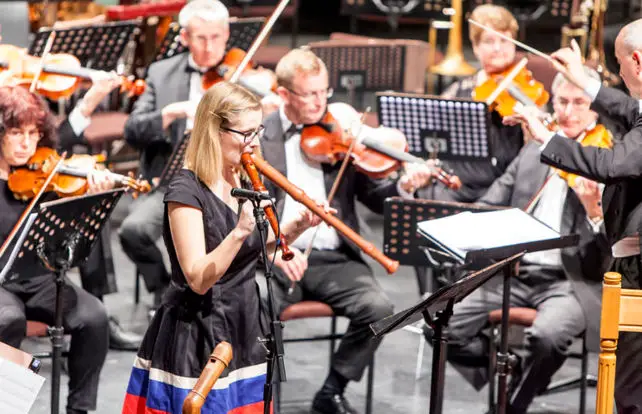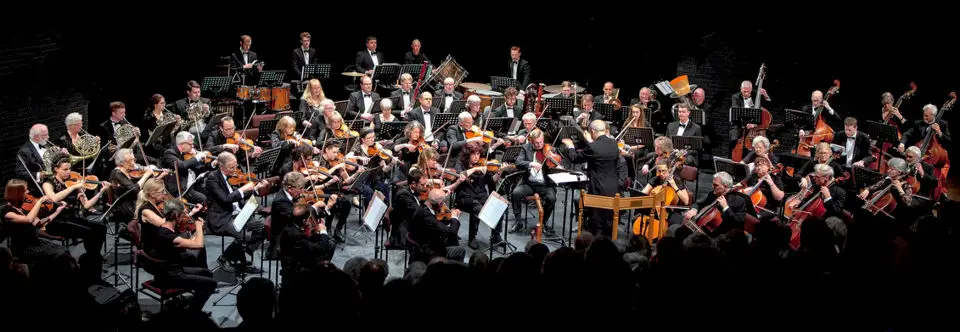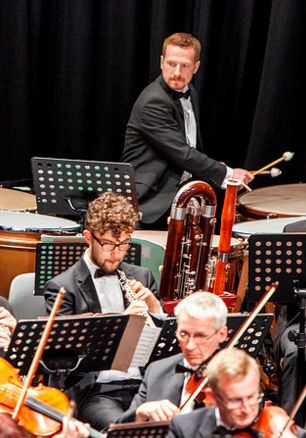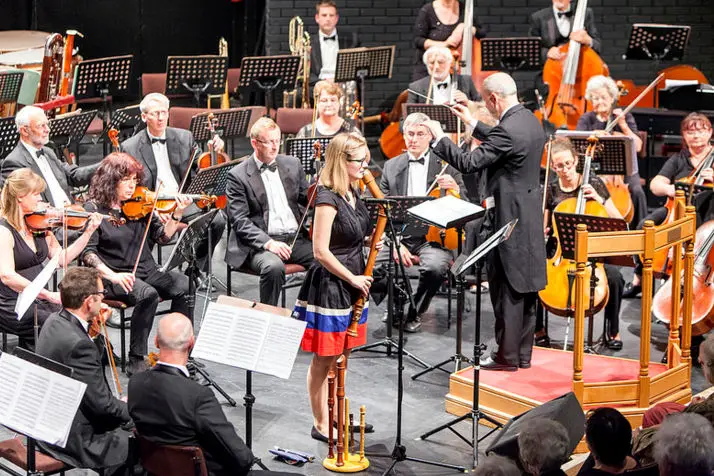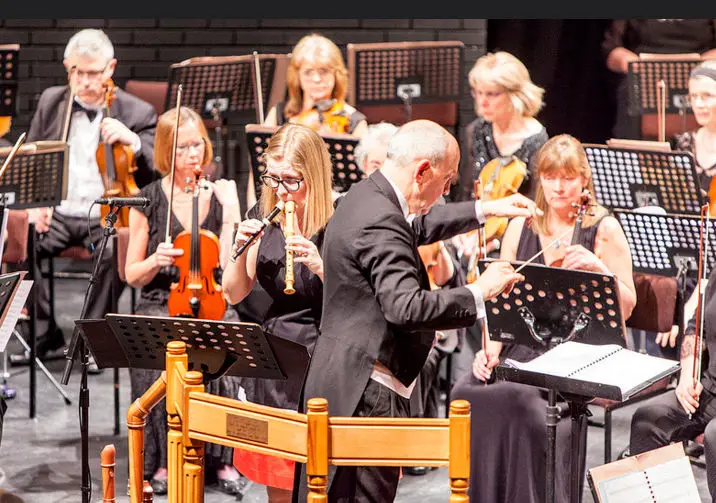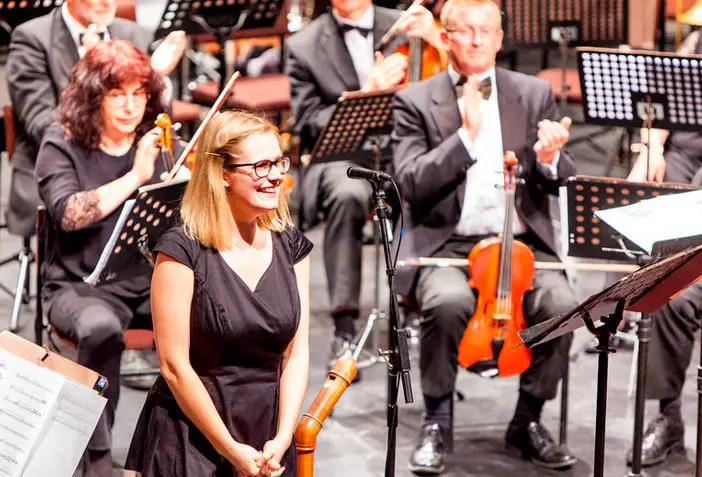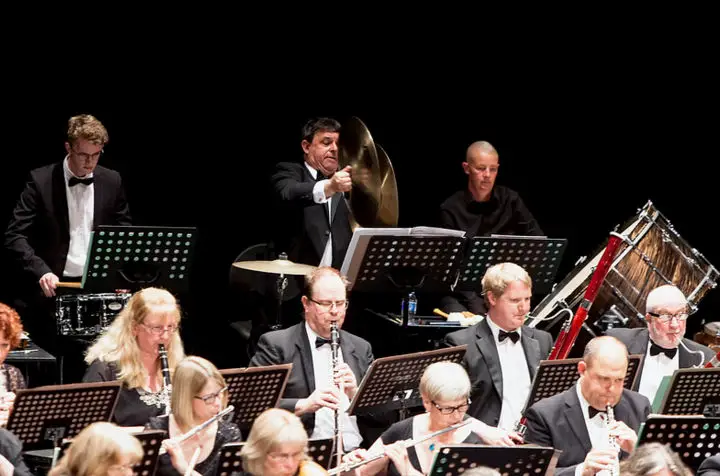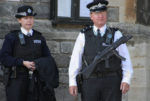Jonathan Dodd shares his review of the latest Isle of Wight Symphony Orchestra (IWSO) concert. Images with kind permission of Allan Marsh. Ed
Last Saturday, 20th May, the Isle of Wight Symphony orchestra performed their fourth concert of this year’s season. I was particularly excited this time, because the programme included a piece I have known and loved for many years, and which I had never heard actually played.
The Medina Theatre was packed again, and there was a high degree of excitement around as the Conductor, Jonathan Butcher, introduced the first piece of the evening. It was Danzon No. 2, by Arturo Márquez, a Mexican composer. I had never heard of this piece, or even of the composer before, but my admittedly slender experience of South American music does include some exposure to the Tango, and Villa-Lobos, and of course, the wonderful Buena Vista Social Club of Havana.
A glorious noise
I wasn’t expecting to find echoes of any of these on Saturday, so I was delighted when they all appeared, among so many other delights, in this splendid dance music. There’s something delightful and enticing in the rhythms of that part of the world, with their elegant string arrangements and complex rhythms. The Danzon No.2 started quietly with a clarinet solo, and swirled around, gradually growing in volume, then stopping to take a breath, and starting the process again, and again.
All the instruments in each section of the orchestra were able to contribute solos and the whole range of their individual sounds to the performance, and I could feel the sheer pleasure felt by every musician in the orchestra. It became a glorious noise, lifting the spirits and beckoning us all to get up and dance. Sadly, we weren’t in a ballroom, so we had to stay in our seats. It was beautiful, and I loved it. This is another one to add to my collection and listen to again.
I never thought I’d hear it actually played
I first met a recorder one week before taking over the Recorder Club at a primary school I worked in many years ago. I was always one week ahead of the children, but I learned to love it and its sound, and it’s a great instrument for introducing children to making music.
I had no idea that recorders figured in Classical music until many years after that, when I chanced upon Vivaldi’s Recorder Concerto in G, and fell in love with it. But I never thought I’d hear it actually played.
It turns out that we have a home-grown recorder virtuoso. Miriam Nerval grew up and learned the recorder with the Isle of Wight Music Service. She has since become a professional recorder soloist, as well as playing in recorder quartet Palisander. She has become something of a Global Recorder Ambassador. She played two very different recorder concertos for us on Saturday.
Astonishingly complex finger-work
The first concerto was modern, and featured some astonishingly complex finger-work on several different recorders, sometimes at the same time. The concerto was written for Piers Adams in 1997, and had the feel of a showpiece for the recorder itself, as well as being filled with interesting tunes and sounds. The recorder isn’t like other instruments, being completely made of wood, and has a soft tone that‘s unique. I may be wrong, but I remember you can’t blow too hard, or it overloads and you lose the note, so it has limited volume.
This concerto took into account these qualities right from the start, featuring a bass recorder, which has an alarming bend in the middle, and is so large and presumably heavy that it needs a neck-strap, like a saxophone. It makes a deep and resonant sound, and it was accompanied by the strings playing very high.
The succeeding movements each featured another recorder, up the scale and smaller in size, through tenor, then soprano, then descant, and finally the delightfully small sopranino, while the orchestra simultaneously played lower, in counter-balance. Occasionally, during the change-over, two recorders had to be played simultaneously. The tempo slowed down in the middle section, which was calm and beautiful, and then speeded up to an extraordinary frantic pace at the end. Miriam Nerval’s fingers were moving so fast that my eyes simply couldn’t keep up with them. It was virtuoso and astonishing, and the applause at the end was thunderous.
The notes cascade out and the fingers fly
After the Bedford concerto, it was time for the Vivaldi. I love this piece, and was looking forward immensely to hearing it. It starts with the orchestra and the recorder playing a beautiful tune together, and gradually the recorder becomes more prominent and takes over, with the orchestra following on. It’s a lovely tune, but it’s also hard work, as the notes cascade out and the fingers fly. Because I had only listened to my CD, I hadn’t appreciated just how fast and precise the fingers need to be, and how rare there’s a place for a quick breath. It was played wonderfully, and joyously. I loved it.
The second movement contains one of my favourite tunes anywhere. It’s like some of the middle movements of Mozart’s piano concertos, in its simplicity and lyrical beauty, and then the third movement is a madcap gallop, charging along at a terrific pace, demanding extraordinary dexterity and energy. Miriam Nerval gave me everything I hoped for, and I was delighted by it all. Thank you. Now I’ve got to get my recorder out and start playing again.
Integrity and creativity during times of great adversity
After the interval, the full orchestra gave us Shostakovich’s Tenth Symphony. Shostakovich lived in tempestuous times, in Soviet Russia. His career was influenced and affected by official criticism from the authorities, who had the opinion that music should reflect their own view of how the world should be. His 8th and 9th Symphonies hadn’t been well-received, and after five years out of the spotlight, and the death of Stalin in 1953, this symphony marked his return.
It’s a long symphony, in four movements, and it represents the struggle to retain one’s integrity and creativity during times of great adversity, and the music and playing reflects the man and the times. The orchestra obviously enjoyed playing this epic symphony immensely, and it requires an intensity and loudness that sometimes feels overwhelming, and it’s long. It gives individuals and groups of musicians many opportunities to engage fully with each other, and every section of the orchestra played magnificently. It was a great evening, and the whole audience left with big smiles on their faces.
Pirates of the Caribbean!
The next concert will be the last of the season, on the theme of “Carnival at Sea”. It’s going to be almost like the Last Night of the Proms, with a lot of crowd-pleasing music, including “La Mer”, by Debussy, and “The Wreckers overture”, by Smythe, and “Molly on the Shore” by Grainger, as well as the splendid Adagio from “Spartacus” by Khatchaturian, Dvorak’s “Carnival Overture”, Arne’s “Fantasia on British Sea Songs”, “Rule Britannia”, and the cherry on top of the cake will be Zimmer’s “Pirates of the Caribbean”.
This will take place on Saturday 1st July at 7:15. If you haven’t got your tickets yet, make sure you don’t miss out. It’ll be packed. I can’t wait. See you there.

